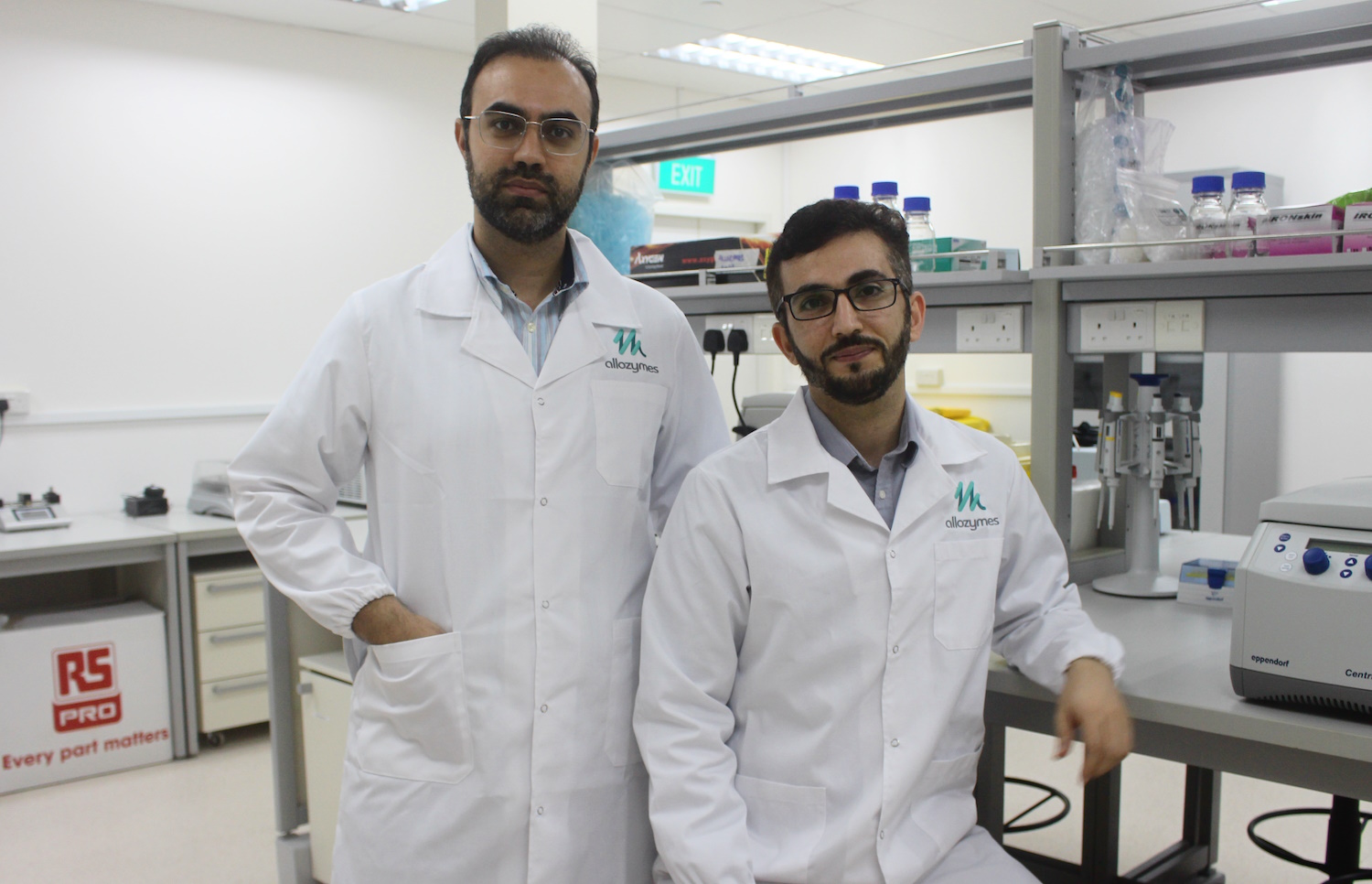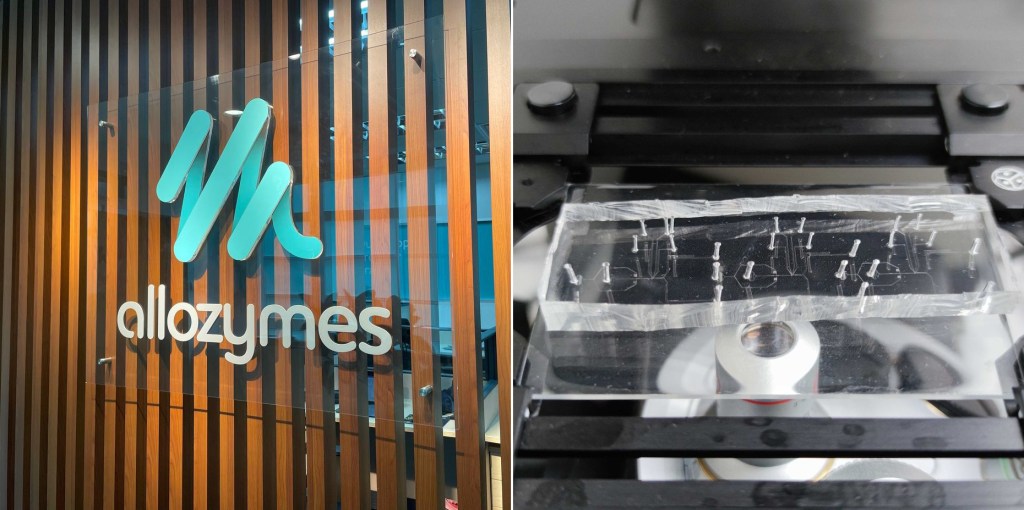Allozymes’ ingenious method of quickly testing millions of bio-based chemical reactions is proving to be not just a useful service, but the basis of a unique and valuable dataset. And where there’s a dataset, there’s AI — and where there’s AI, there are investors. The company just raised a $15 million Series A to grow its business from a helpful service to a world-class resource.
We first covered the biotech startup in 2021, when it was taking its first steps: “Back then we were less than five people, and at our first lab — a thousand square feet,” recalled CEO and founder Peyman Salehian.
The company has grown to 32 people in the U.S., Europe and Singapore, and has 15 times the lab space, which it has used to accelerate its already exponentially faster enzyme-screening technique.
The company’s core tech hasn’t changed since 2021, and you can read the detailed description of it in our original article. But the upshot is that enzymes, chains of amino acids that perform certain tasks in biological systems, have until now been rather difficult to either find or invent. That’s because of the sheer number of variations: A molecule may be hundreds of acids long, with 20 to choose from for each position, and every permutation potentially a totally different effect. You get into the billions of possibilities very quickly!
Using traditional methods, these variations can be tested at a rate of a few hundred per day in a reasonable lab space, but Allozymes uses a method in which millions of enzymes can be tested per day by packing them in little droplets and passing them through a special microfluidics system. You could think about it like a conveyor belt with a camera above it, scanning each item that zooms by and automatically sorting them into different bins.

These enzymes could be just about anything that’s needed in the biotech and chemical industry: If you need to turn raw materials into certain desirable molecules, or vice versa, or perform numerous other fundamental processes, enzymes are how you do it. Finding a cheap and effective one is seldom easy, and until recently the entire industry was testing about a million possibilities per year — a number Allozymes aims to multiply over a thousandfold, targeting 7 billion variants in 2024.
“[In 2021] we were just building the machines, but now they’re working very well and we are screening up to 20 million enzyme variants per day,” Salehian said.
The process has already attracted customers across a number of industries, some of which Allozymes can’t disclose due to NDAs, but others have been documented in case studies:
- Phytoene is an enzyme found naturally in tomatoes and ordinarily harvested in tiny quantities from the skins of millions of them. Allozymes found a pathway to make the same chemical in a bioreactor, using 99% less water (and presumably space).
- Bisabolol is another useful chemical found naturally in the candeia tree, an Amazon-native plant that has been driven to endangered status. Now a bio-identical bisabolol can be produced in any quantity using a bioreactor and the company’s enzymatic pathway.
- Fibers of plants and fruits like bananas can be turned into a substance called “soluble sweet fiber,” an alternative to other sugars and sweeteners; Allozymes got a million-dollar grant to accelerate this less-than-easy process. Salehian reports that they have made cookies and some bubble tea with the results.
I asked about the possibility of microplastics-degrading enzymes, which have been a target of much research and also figure in Allozymes’ own promotional materials. Salehian said that while it’s possible, at present it isn’t economically feasible under their current business model — basically, a customer would need to come to the company saying, “I want to pay to develop this.” But it’s on their radar, and they may be working in plastics recycling and handling soon.
So far this has all more or less fallen under the company’s original business model, which amounts to enzyme optimization as a service. But the roadmap involves expanding into more from-scratch work, like finding a molecule to match a need rather than improving an existing process.
The enzyme-tailoring service Allozymes has been doing is to be called SingZyme (as in single enzyme), and will continue to be an entry-level option, filling the “we want to do this 100x faster or cheaper” use case. A more expansive service called MultiZyme will take a higher-level approach, discovering or refining multiple enzymes to fulfill a more general “we need a thing that does this.”
The billions of data points they collect as part of these services will remain their IP, however, and will constitute “the biggest enzyme data library in the world,” Salehian said.

“You can give the structure to AlphaFold and it will tell you how it folds, but it can’t tell you what will happen if it binds with another chemical,” Salehian said, and of course that reaction is the only part industry is concerned with. “There’s no machine learning model in the world that can tell you exactly what to do, because the data we have is so little, and so fragmented; we’re talking 300 samples a day for 20 years,” a number Allozymes’ machines can easily surpass in a single day.
Salehian said that they are actively developing a machine learning model based on the data they have, and even tested it on a known outcome.
“We fed the data to the machine learning model, and it came back with a new molecule suggestion that we are already testing,” he said, which is a promising initial validation of the approach.
The idea is hardly unprecedented: We’ve covered numerous companies and research projects that have found machine learning models can be very helpful in sorting through huge datasets, offering extra confidence even if their outcomes can’t be substituted for the real process.
The $15 million A round includes new investors Seventure Partners, NUS Technology Holdings, Thia Ventures and ID Capital, with repeat investment from Xora Innovation, SOSV, Entrepreneur First and Transpose Platform.
Salehian said the company is in great shape and has plenty of time and money to achieve its ambitions — with the exception that it may raise a smaller amount later this year in order to fund an expansion into pharmaceuticals and open a U.S. office.































Comment